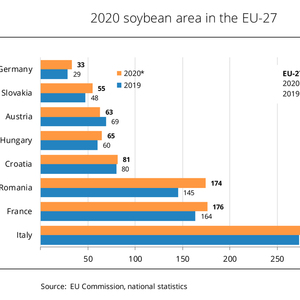EU soybean production up 11% this year, doubled in 10 years

June 18, 2020
BY UFOP
Soybean production in the EU-27 continues to expand in 2020 due to significant increases in farmland planted with soybeans in key EU member states.
According to information published by the EU Commission, soybean production in the EU-27 more than doubled over the past 10 years. The area planted with soybeans in 2020 is reported to amount to almost 1 million hectares. This is up around 11 percent year-on-year.
Italy, with a soybean area of presumably 306,000 hectares and a 12 percent increase in area, is likely to remain the biggest soybean producer of the EU-27 by far. This means that the country retains its share of around one third of the total soybean area in the EU-27.
Advertisement
Advertisement
The soybean area has also been significantly expanded in other EU member states. Romania has recorded an increase of 20 percent to 174,000 hectares, whereas Slovakia has seen a 15 percent rise to 55,000 hectares. German farmers also dedicated more land to soybeans than they did the previous year. 33,000 hectares translate to a 14 percent increase. Only Austria has recorded a 9 percent decline to 63,000 hectares because of excessively dry conditions at the time of sowing.
According to investigations conducted by Agrarmarkt Informations-Gesellschaft (mbH), the soybean harvest is also likely to increase because of the expansion in production area in many EU countries. Germany did not harvest any significant amount of soybeans until 2016. This year, the EU Commission expects the country to harvest 91,000 metric tons. This would mean a doubling of German production over the past four years. Romania is assumed to see the biggest increase, of more than 20 percent to 454,000 tons. A decline is only expected in Austria due to the reduction in area planted.
Advertisement
Advertisement
The Union zur Förderung von Oel- und Proteinpflanzen (UFOP) views this development as confirmation of the general willingness of farmers to further expand the production of grain legumes. Depending on site conditions, grain legumes are a key crop to complement crop rotations for more sustainability and climate resilience. UFOP has noted that in the EU Commission’s “Farm to Fork” strategy, this aspect is rightly a key aspect for creating regionality and adding local value. These crop rotation systems should also include rapeseed and sunflowers as additional flowering plants alongside grain legumes.
All in all, these crops contribute to improving biodiversity through different flowering times, soil quality through enrichment with humus and carbon, and climate protection through fewer nitrogen applications because of the nitrogen fixation capacity of grain legumes. The association has stressed that the cultivation of grain legumes contributes to producing GM-free feed and/or food protein, thus cutting the need for protein imports from non-EU countries.
UFOP therefore expects that the comprehensive ecosystem service approach will find its way into the aims of the agricultural strategy of the German Ministry of Agriculture. UFOP considers this to be a necessary requirement for ensuring that locally adapted crop rotation systems can also contribute to economic sustainability on arable farms. However, the association has pointed out that, in the end, consumers decide at the point of sale whether, and to what extent, extended crop rotation systems that provide the desired ecosystem service are also rewarded.
Related Stories
The U.S Department of Energy Bioenergy Technologies Office, in partnership with the Algae Foundation and NREL, on July 21 announced the grand champion and top four winning teams of the 2023 - 2025 U.S. DOE AlgaePrize Competition.
The USDA significantly increased its estimate for 2025-’26 soybean oil use in biofuel production in its latest World Agricultural Supply and Demand Estimates report, released July 11. The outlook for soybean production was revised down.
U.S. fuel ethanol capacity fell slightly in April, while biodiesel and renewable diesel capacity held steady, according to data released by the U.S. EIA on June 30. Feedstock consumption was down when compared to the previous month.
The U.S. EPA on July 8 hosted virtual public hearing to gather input on the agency’s recently released proposed rule to set 2026 and 2027 RFS RVOs. Members of the biofuel industry were among those to offer testimony during the event.
The USDA’s Risk Management Agency is implementing multiple changes to the Camelina pilot insurance program for the 2026 and succeeding crop years. The changes will expand coverage options and provide greater flexibility for producers.
Upcoming Events










